Is Your Guinea Pig Is Sick?: Behavioural And Physical Signs To Look Out For!
Don’t let the size of
a Guinea Pig fool you, they require as much responsibility and care as all
other types of Pets. In fact, because they are so tiny, it may be tough to spot
any impending illness or unusual behaviour right off the bat. Thankfully, based
on the experiences of Guinea Pig owners and Veterinarians, we know a few clear
indicators to look out for.
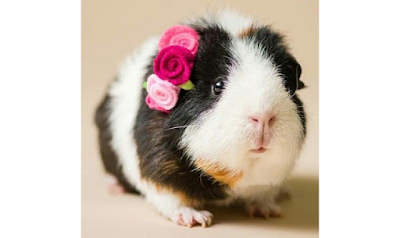 |
| Source |
What are some behavioural signs to look out for?
A common practice
amongst Guinea Pig owners that they absolutely stand by is through spending time
with your Cavy pal. By taking note of their usual behaviour and patterns, it
enables owners to point out any abnormalities at a much faster rate. Handling
them often during these times is when you could gently check for any physical
abnormalities too, which we will be covering below. Without further ado, let’s
look at the 9 signs that tell if your Guinea Pig is ill.
Behavioural Signs
1. Loss Of Appetite — As with all other
types of Pets or animals, a loss of appetite is usually a clear sign of
distress. While Cats spend more than 50% of the day sleeping, our Cavy friends
spend that time eating and munching away.
Also, Guinea Pigs are actually unable
to survive through more than 16 hours of not consuming any food, so keep a
close eye on their eating habits, including water intake too!
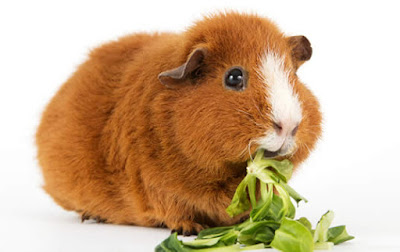 |
| Source |
2. Weight Difference — Keep a routine weekly
weight check of your pet Guinea Pig(s). Healthy Guinea Pigs maintain a pretty
consistent weight, so a sudden weight gain or loss of about 55 grams within one
week is considered a red flag.
Excessive eating or loss of appetite usually
indicates an underlined medical issue. Make a trip to a trusted Vet to have
them checked out immediately.
 |
| Source |
3. Change Of Behaviour — When your Guinea Pig
is suddenly displaying unusual behaviour such as avoidance or being extra
cautious around you, it could be due to a medical issue. This includes the
sudden disinterest in their favourite treat, being lethargic most of the time,
and anxiety as well.
Understanding your pet Cavy’s behaviour is key here, and
only you can deem best what are odd behaviours, through bonding and spending
time with them ☺
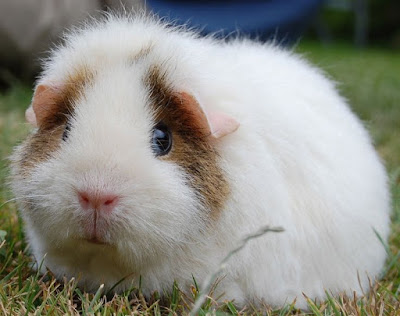 |
| Source |
4. Walking Sideways — If you
notice your Guinea Pig walking sideways, lopsided, walking in a circular
direction, or scratching their Ears excessively, it is usually a clear sign of
Ear infection, making them unable to regain their bearings while walking. Do
seek medical help immediately!
5. Check Their Stool — Stool and
urine tells us a lot about our Pet’s health, and a healthy Cavy stool and urine
means no diarrhoea, no excessive urination and also lack of stool. At times,
owners also spot traces of blood in their Cavy’s urine or stool.
None of which are
desirable signs of course, and you should seek immediate medical help.
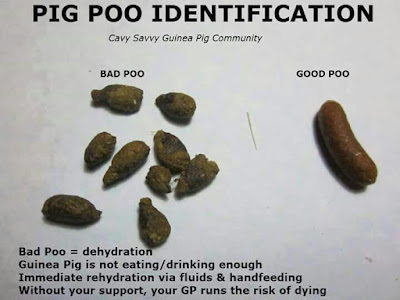 |
| Source |
Physical Signs To Look Out For
Behavioural
signs can be tougher to notice, however some physical signs can also help
determine if your pet Guinea Pig is unwell. We must emphasise the fact that a
trip to the Vet should not be dragged out for Guinea Pigs. Cavies are
known for their abrupt switch in health, one minute it appear to be healthy,
and the next minute in dire situations. When you notice one or two of these
signs in this article, bring your Guinea Pig in for a medical examination. It’s
best to be safe than sorry.
Check out
the physical signs you can keep an eye out for!
5. Growth And Lumps — While
handling your Guinea Pig, gently feel their bodies for odd lumps. Guinea Pigs
that are older are prone to tumour growths, and while most of them may usually
be benign, it would be safer to have them checked out, to avoid fatal cancer
from developing.
 |
| Source |
6. Hair Loss — Healthy
Guinea Pigs have healthy hair, so check them regularly for bald patches, or
skin issues like reddish, inflamed, or dry and cracked skin (especially with hairless aka skinny pigs!)
These are most
likely due to mites or infections, drop by your trusted Vet for medical
assistance immediately!
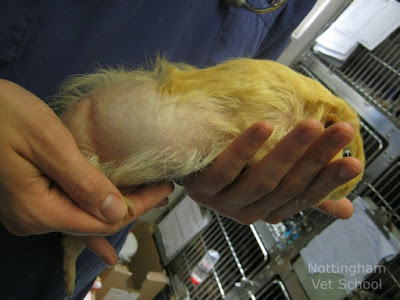 |
| Source |
7. Bad Eyes — Keep your
eyes peeled for any abnormal discharge around your pet Cavy’s eyes, they should
not be pink or red, which is often the cause of an eye infection.
As long as
your Cavy does not normally have red eyes (born with it) and you notice some crusting or discharge around the eyes, seek medical help.
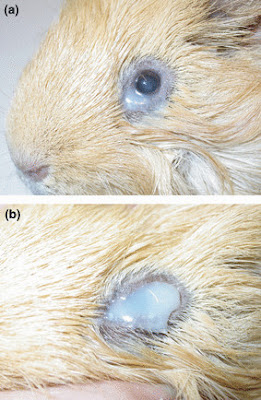 |
| Source |
8. Overgrown Teeth — Like
Rabbits, the need to chew all the time ties up with a healthy set of teeth for
Guinea Pigs, in which they can get from their daily roughage of Hay and greens.
Keep an eye out for excessive drooling, bleeding or loss of appetite that could
be caused by overgrown teeth, resulting in discomfort and pain, and leading to
nasty mouth infection. Visit the Vet immediately to have their teeth and mouth
checked out.
| Source |
9. Having The Sniffles — Pneumonia
stands as one of the most common illness that our Cavy friends are prone to,
usually evident by excessive discharge from their noses, sneezing, abnormal
breathing that is close to wheezing and sometimes quivering, as noted by a few
owners.
As always, do not wait to see how things might pan out, seek medical
attention immediately.
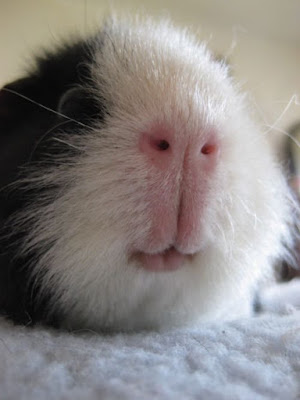 |
| A healthy nose |
Seeking The Best Help
Guinea Pig
owners also suggest having your pet Cavy checked out by a Veterinarian that has
great professional experience with Guinea Pigs. For example, not all Vets are
proficient with medical knowledge of pet Rabbits, Cats or Birds.
You might
also be interested in these:
Your Stories Can Be Heard Too
Your
voices are important to us and the Pets community! Our readers are encouraged
to share their Pet-related reviews of a
place and its services, experiences, even lifestyle tips and tricks to better
our Pets lives, on our platform, one paw at a time. Be a part of an educational
and informative Pets community because at ThePetsDialogue, your voices could
make a huge difference.
Write to us at [email protected] today!
Our website is a work in progress, however, if you did find our articles interesting please do feel free to share! For more Pet care tips and other Pet-related articles, head to www.thepetsdialogue.com ☺
Disclaimer
This article was written with informational purposes, as you know, we’d love to share our collective research and experiences as fellow Pet owners and lovers. It is not meant to alternate in any way as advice or diagnosis of Professionals.
ThePetsDialogue claims no credit for images posted on this article unless otherwise displayed/stated. All rights go to respective owners as mentioned. If you do not wish for your image(s) to appear here do drop us an e-mail and it will be removed promptly. If you do wish to use any of our original published information, you are welcome to contact us!




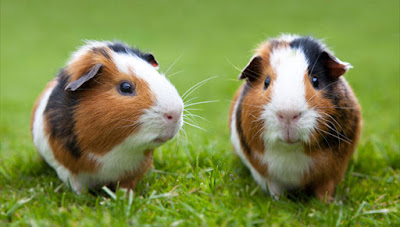
No comments:
Post a Comment